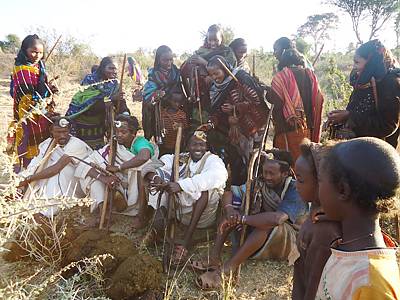- Ethiopia



The Gada System in Ethopia

© Authority for Research and Conservation of Cultural Heritage (ARCCH), Ethiopia, 2014
1. ICH domains
Oral traditions and expressions, performing arts, social practices, rituals and festive events, knowledge and practices concerning nature and the universe
2. Short description
Gada is a traditional system of governance used by the Oromo people in Ethiopia. It regulates the political, economic, social and religious activities of the community, and deals with issues, such as conflict resolution, reparation and the protection of women’s rights. It also serves as a mechanism for enforcing moral conduct and building social cohesion. Meetings and ceremonies take place under a sycamore tree (considered the Gada symbol). Knowledge about the Gada system is transmitted to children at home and at school. Gada is organized into five classes, of which one functions as the ruling class. The Abba Gada, the elected chairman of the ruling class, presides over the assembly. Together, with the class in power, he is responsible for day-to-day administration of the community's local affairs, including dispute arbitration and the maintenance of social order.
The social practice and traditions of the Gada system were inscribed on the Representative List of the Intangible Cultural Heritage of Humanity in 2016.
Further information:
Detailed information and audiovisual materials on the Gada system and related social practices can be found in the related web sources below (all in English). For more on the Oromo approach to conflict prevention and resolution, see also the article by H. Tuso in the last link below.
https://ich.unesco.org/en/RL/gada-system-an-indigenous-democratic-socio-political-system-of-the-oromo-01164
https://allafrica.com/stories/201612210768.html
https://www.oromiatourism.gov.et/attachments/article/13/The%20%20Gada%20system.pdf
http://www.hamdesatuso.com/IndigenousProcessesofConflictResolutioninOromoSociety.pdf
3. Link with sustainable development
In the Gada system, each class progresses through a series of grades, giving the system remarkable continuity. The system reflects the Oromo belief that, as much as possible, conflict should be prevented from occurring. Should it occur, everything should be done to prevent it from escalating and all institutions should work together to manage the conflict. Safeguarding this intangible cultural heritage will ensure the promotion of peace and justice as per SDG 16 and safe, inclusive societies as per SDG 11.
In addition, the siinqee stick within the Gada system symbolically provides women with control over resources, encourages solidarity, deters men from infringing upon their rights, and promotes gender equality. A woman receives this special stick on her wedding day to protect her rights. The Gada system thus also contributes to SDG 5 on achieving gender equality and empowering all women and girls. For further information, see:
https://www.opride.com/2014/10/14/wayyuu-siinqee-and-gora-among-the-arsi-and-guji-oromo/
4. Questions for reflection
Despite the important meaning the Gada system carries for the communities, the traditional structures of governance are not always fully appreciated today. Challenges such as migration, socio-political marginalisation and land privitisation are among the reasons for the decline in the role of the Gada system. This begs the question of how traditional systems of governance can be better recognised and transmitted. One of the measures that were taken by the local authorities to safeguard the element has been its inclusion in the school curriculum so the knowledge associated with Gada can be transferred to the younger generations. What do the communities and groups that transmit the system think? What are their views and perspectives?
Some pastoralists report that the Gada system still works well during periods of good rains, but weakens during drought, as members of the Gada are overwhelmed by the myriad of crises [and conflicts over grazing land and water] they face. Is there a role for traditional governance systems in developing community resilience, mitigation and coping strategies when faced with the effects of climate change? For more on this issue, see:
http://www.drrplatform.org/images/2015_Ethiopia_Borana_Risk_Assessment.pdf
The Gada system operates at the local level, but is not officially recognised within the current national consitutional framework – it functions in parallel to the state political institutions (https://participedia.net/method/4865). What are some challenges or issues which might arise from this?